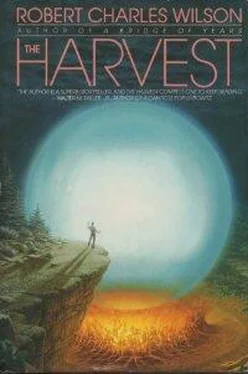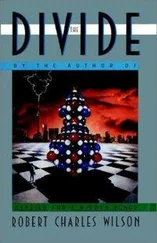Their job was to function as the voice of the Artifact. That is, of the Travellers.
Annie called them “Travellers” because that was their name for themselves: It defined them. Like the microbes they created, they were not organic beings. Unlike their creations, they once had been. They had been both organic and planetbound: creatures like ambulatory sponges, building their cities in the methane-rich tidal sinks of an Earth-sized moon orbiting a Jovian planet of an unimaginably distant star.
They had outgrown their world. They had poisoned it with organic and machine wastes, a catastrophe averted only by their abandonment of both organism and mechanism. In the wake of that crisis they became Travellers: planetless, bodiless.
The Artifact was their world now. It was both a physical structure and a much larger virtual environment. They inhabited it, a greater number of souls than the Earth contained human beings, but only a few of them occupied physical bodies at any given time, and then only for the purpose of repairing and maintaining the Artifact itself.
They were, she told Matt, not a hive or a computer or any such easily imagined thing; they were separate creatures, individuals, unique—but capable of so much more, being immaterial; of complex joinings and indefinite sleeps, of enduring the long journeys between stars without boredom or decline, of learning without ending. Their lifespan was indefinite, unlimited. They had achieved a kind of immortality.
They had been Travellers, Annie said—-knowing some of these things only as she said them—since the Earth was a whirl of dust and the sun a hot new star, and they had forgotten nothing of what they had seen in those millennia. They were a vast library of inconceivably ancient wisdom, and they had arrived at the Earth at what they considered a critical and fortuitous moment, because, Annie said, we are what they had once been: intelligent, planetbound, and poisoning a world with our waste products.
It was obvious, she said, why they hadn’t communicated with governments or world leaders. They had a better means of communication, the cybernetic microbes, a kind of arm of themselves with which they could touch each human being individually. This more intimate contact was the only communication worthy of the word. The microbes, which might be called neocytes, interfaced with nervous tissue, touching but not changing it. At the brink of Contact they had soothed the frightened population of the Earth—sedated us, Annie said, yes, but only long enough and deeply enough to prevent panic. Then they had induced a kind of long, deep sleep, and in that sleep the Travellers had spoken. They had spoken to six billion human beings over the course of the next thirty hours, and what they spoke was not merely language but a complex of, for lack of a better word, understandings, deeper and more profound than language could ever be. And they had explained all this and more, much more than Annie could tell.
But Matt, she said, you must have felt it: All the possibilities… the literally infinite possibilities… the lives they led… and their place, the Artifact, like a nautilus shell, not dead, as it had seemed, but filled with lives strange and various beyond belief. They must have showed you that.
They must have offered it to you, Annie said. Because they offered it to me.
They said I could have it, too.
Do you want to live? they had asked. Live without dying? Live, in effect, forever?
And Annie had said yes.
Do you want to live, they had asked, even if you change? Even if you become, in time, something no longer entirely human?
And that had given her pause; but she thought again of their long, complex, interesting lives; she understood that everything changed, that death itself was a kind of change, that of course it was impossible to live forever without changing—change was to be expected.
And again she said yes.
* * *
She poured coffee and put the cup in front of Matt. Matt examined the cup. It was a solid thing, gratifyingly real. A familiar thing.
Beulah yawned and jumped out of his lap; preferred, apparently, the sunlit floor.
Annie put her hand on his shoulder. “What did you tell them, Matt?” He pulled away from her touch. “I told them no.”
The President, whose given name was William, did what he had not done in quite this way for many years: he took a walk.
He left the White House by the Main Portico and crossed Pennsylvania Avenue into Lafayette Square. He walked alone.
It was a fine September morning. The air was cool, but a gentle sunlight warmed his hands and face. The President paused as he entered the park. Then he smiled and shrugged off his jacket. He unbuttoned his collar and pulled off his tie. He folded the black silk tie into a square and tucked it absentmindedly into his hip pocket.
No etiquette in the new world, he thought.
He was reminded of the story about Calvin Coolidge, who had shocked the fashionable guests at a White House breakfast by pouring his heavily creamed coffee into a saucer. Shocked but unfailingly polite, Coolidge’s guests had done the same. They waited wide-eyed for the President to take the first sip. At which point Coolidge picked up the saucer, leaned over, and presented it to the White House cat.
The story was funny, but it seemed to William there was something ugly about it, too—too much of the ancient vertebrate politics of dominance and submission. After all, what was a President that anyone should be frightened of one? Only a title. A suit of clothes—and not a particularly comfortable one.
He was ashamed that there had been times when he thought of himself as “the President”—as a sort of icon, less man than emblem. He supposed that was how the Roman emperors might have felt, anointed by the gods; or their Chinese counterparts ruling under the Mandate of Heaven. These are dream-names we give ourselves, he thought; indeed, much of his life seemed like a dream, a dream he had been dreaming too deeply and for too long. A dream from which he had been awakened by a dream. The morning air made him feel young. He remembered a summer his family had spent at a beach resort in Maine. Not the riverside cabin he had recalled in that long-ago address to the nation. That had been an isolated July in the Adirondacks, much embroidered by his speechwriter. The family’s summer place in William’s twelfth year had been a fabulous old resort hotel, erected in the Gilded Age and preserved against the solvent properties of salt air and progress. Its attractions were its fine linens, its European cuisine, and its two miles of wild Atlantic beach. William’s mother had admired the linen. William had admired the beach.
He had been allowed to explore the beach by himself as long as he promised to stay out of the water, which was, in any case, too chilly and violent for his liking. He loved the ocean from a cautious distance, but he loved it nonetheless. All that summer, every morning, he would choke down breakfast and bolt from the hotel like a wild horse vaulting a fence. He ran where the sand was packed and hard, ran until his side stitched and his lungs felt raw. And when he couldn’t run anymore he would take off his shoes and explore the wetter margin of the beach, where water oozed between his toes and odd things lived in the tide pools and among the rocks.
When he tired of that, he would sit in the high salt grass and gaze at the juncture of ocean and sky for as much as an hour at a time. England was across that water. England, where American flyers had gone to join the battle against the Luftwaffe. Beyond England, Vichy France. Europe under the heel of the Nazis; embattled Stalingrad.
Читать дальше












